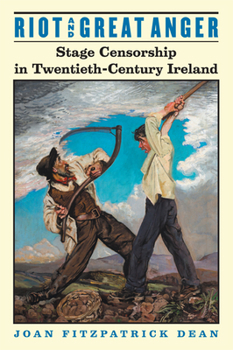Riot and Great Anger: Stage Censorship in Twentieth-Century Ireland
Under the strict rule of twentieth century Irish censorship, creators of novels, films, and most periodicals found no option but to submit and conform to standards. Stage productions, however, escaped official censorship. The theater became a "public space"--a place to air cultural confrontations between Church and State, individual and community, and "freedom of the theatre" versus the audience's right to disagree.
Joan FitzPatrick Dean's Riot and Great Anger suggests that while there was no state censorship in early-twentieth-century Ireland, the theater often evoked heated responses from theatergoers, sometimes resulting in riots and the public denunciation of playwrights and artists. Dean examines the plays that provoked these controversies, the degree to which they were "censored" by the audience or actors, and the range of responses from both the press and the courts. She addresses familiar pieces such as those of William Butler Yeats, John Millington Synge, and Sean O'Casey, as well as the works of less known playwrights such as George Birmingham. Dean's original research meticulously analyzes Ireland's great theatrical tradition, both on the stage and off, concluding that the public responses to these controversial productions reveal a country that, at century's end as at its beginning, was pluralistic, heterogeneous, and complex.
Joan FitzPatrick Dean's Riot and Great Anger suggests that while there was no state censorship in early-twentieth-century Ireland, the theater often evoked heated responses from theatergoers, sometimes resulting in riots and the public denunciation of playwrights and artists. Dean examines the plays that provoked these controversies, the degree to which they were "censored" by the audience or actors, and the range of responses from both the press and the courts. She addresses familiar pieces such as those of William Butler Yeats, John Millington Synge, and Sean O'Casey, as well as the works of less known playwrights such as George Birmingham. Dean's original research meticulously analyzes Ireland's great theatrical tradition, both on the stage and off, concluding that the public responses to these controversial productions reveal a country that, at century's end as at its beginning, was pluralistic, heterogeneous, and complex.
Format:Hardcover
Language:English
ISBN:0299196607
ISBN13:9780299196608
Release Date:June 2004
Publisher:University of Wisconsin Press
Length:240 Pages
Weight:1.08 lbs.
Dimensions:0.8" x 6.0" x 9.6"
Customer Reviews
0 rating





